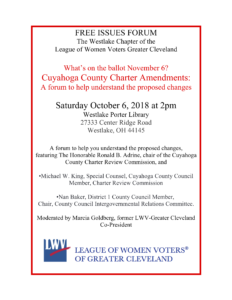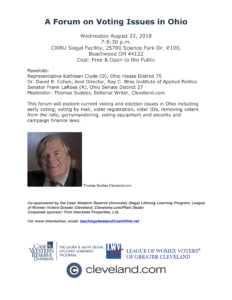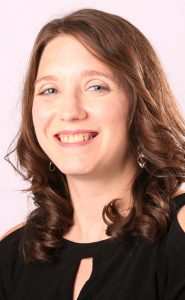
Saturday October 6, 2018 at 2pm
Cuyahoga County Charter Amendments:
The Honorable Ronald B. Adrine, chair of the Cuyahoga County Charter Review Commission, and other members of the Commission.
www.teachingcleveland.org

Silvana Ferri, adult at center, receives a group hug from kids at the Cleveland Children’s Academy in October 2010 after the surprise announcement that she’d won a national $10,000 Early Childhood Educator Award.
(Thomas Ondrey, The Plain Dealer, File, 2010)
In his powerful eulogy of Louis Stokes, the Rev. Otis Moss Jr. repeatedly marveled that the longtime congressman was able to “rise above his circumstances,” escaping a life of poverty for one filled with memorable accomplishments.
The single most important requirement to rise above those circumstances, to earn that ticket out of life in the projects, was education.
Lou and Carl Stokes both spoke often of their mother, Louise, and her relentless focus on the subject.
“My mother had scrubbed floors, cleaned clothes and served dinners in order to make a life for us,” recalled Stokes, in an interview at his home just a month before his death Aug. 18 at the age of 90. “When you felt those cold hands and calluses, you began to understand what she was trying to say to us in terms of getting an education.”
It’s a common theme, especially among successful minorities who grew up poor.
Former Cleveland City Council President George Forbes, the last of eight children born in a segregated Memphis, talks similarly of his mother — “she was a great lady; to this day, I miss my mother” — sending her children north, where they would have a better chance to earn an education beyond high school.
And though a mother’s obsession with the future of her children is hardly unique to any culture, for children who grow up in poverty — especially black children — history tells us that education is pretty much the only way out.
The evidence is overwhelming. Consider the most successful black elected officials of the last 50 years:
Virgil Brown, Lloyd Brown, Charles Carr, Forbes, Marcia Fudge, Frank Jackson, Leo Jackson, Perry Jackson, Stephanie Tubbs Jones, Peter Lawson Jones, Arnold Pinkney, the Stokeses, George White and Mike White.
Every one of them went to college. Most earned two degrees. Lawson Jones went to Harvard. Mike White was the first black student body president of Ohio State University.
Over time, Mayor Frank Jackson’s school reform plan — with a huge assist from the Cleveland Foundation, the Gund Foundation and corporate leaders — will bring incremental improvements in student performance. There are more good schools in Cleveland today than there were four years ago.
Last year’s statewide report cards showed that Cleveland school students were learning a bit more. Nevertheless, Cleveland still ranked a dismal 607 out of the 610 districts.
That same report card showed that nine of the state’s 14 worst-performing school districts are in Northeast Ohio. Six of the 14 are in Cuyahoga County.
This year’s statewide report cards are likely to provide more documentation that efforts to fix Cleveland schools are enjoying a degree of success. But expecting “transformational” results anytime soon is unrealistic, especially given Cleveland’s daunting poverty rate.
The 1970 census found that 17.1 percent of Cleveland’s 750,903 residents lived below the poverty line. A census update issued last year estimated that 35.4 percent of Cleveland’s 389,521 live below the poverty line.
So, while the city’s population is barely half what it was 45 years ago, its poverty rate has more than doubled.
I’ve been on this soapbox for a decade now, but the single best investment Cuyahoga County can make in its future is a massive investment in early childhood education.
Free, high-quality preschool for needy 3- and 4-year-olds, coupled with intensive parental mentoring and effective programs to reduce the alarming rate of births out of wedlock, might be the only way out.
History tells us County Executive Armond Budish is no risk-taker. But I believe Budish has concluded that a huge expansion of early childhood education should be his signature accomplishment as county executive.
If Budish wants to leave a legacy of change and accomplishment, he’ll ignore his cautious instincts and seize the moment.
So staggering is the cost of our underinvesting in the education of poor children that economists of all political persuasions, including Nobel laureate James Heckman, have concluded that quality preschool will, over time, save taxpayers trillions.
And Port Clinton native Robert Putnam, former dean of Harvard’s Kennedy School of Government, argues in his phenomenal best-seller, “Our Kids: The American Dream in Crisis,” that “to ignore these kids violates our deepest religious and moral values” and “undermines our democracy and perhaps even our political stability.”
“Our Kids” should be required reading for every elected official. Members of Gov. John Kasich’s administration should have read it last year, before squashing a budget proposal by state Sen. Peggy Lehner to increase funding for high-quality preschool by $100 million.
That’s the Team Kasich way. If it’s not their idea, it can’t possibly be a good one.
“Of all the things we can do, the biggest single one is early childhood education,” Putnam said in an interview this spring.
With it, thousands of Cuyahoga County’s poor kids might just have a shot. Without it, most probably won’t.
A proud man, Lou Stokes enjoyed all the deserved attention that came his way late in life. But my guess is he’d gladly take his name off all those buildings that bear it in exchange for an investment that offers the poor kids in Cuyahoga County an opportunity to rise above their circumstances and lead better lives.
Brent Larkin was The Plain Dealer’s editorial director from 1991 until his retirement in 2009.
To reach Brent Larkin: blarkin@cleveland.com

The flyer is here
Wednesday August 22, 2018
“A Forum on Voting Issues in Ohio”
7pm-8:30pm
Panelists:
Representative Kathleen Clyde (D), Ohio House District 75
Dr. David Cohen, Asst. Director, Ray C. Bliss Institute of Applied Politics
Senator Frank LaRose (R), Ohio Senate District 27
Moderator: Thomas Suddes, Editorial Writer, Cleveland.com
This forum will explore current voting and election issues in Ohio including early voting, voting by mail, voter registration, voter ID laws, removing voters from the rolls, gerrymandering, voting equipment and security and campaign finance laws.

Thomas Suddes, Cleveland.com
CWRU Beachwood Facility: 25700 Science Park Dr #100, Beachwood 44122
Cost: Free & Open to the Public
Cosponsors Plain Dealer/Cleveland.com. CWRU Siegel Lifelong Learning, League of Women Voters-Greater Cleveland.
Corporate sponsor: First Interstate LTD
The blaze that sparked the modern environmental movement . . . or did it?
Click here to read

The post summary of forum is here
Tuesday July 17, 2018
“Ohio Gun Laws: What are our options?”
Heights Public Library Main 7-8:30pm
Representatives from:
League of Women Voters of Ohio Lobby Corps
Moms Demand Action
Ohio Coalition Against Gun Violence
Ohioans for Gun Safety
moderated by
Darrielle Snipes, Ideastream/WCPN
All open to the public. Please contact if you have questions about any of these events: teachingcleveland@earthlink.net


Wednesday May 16, 2018 7-8:30pm
“Women in Politics: How to get more women to run for office in Ohio”
moderated by Mary Kilpatrick, Reporter, Cleveland.com
The Cleveland.com post forum summary is here
The video is here
Women make up over 51% of the voting electorate and yet men still far outnumber women in elected office in Ohio and across the country. This forum will explore options for increasing the number of women who run and hold elected office, particularly in Ohio.
Panelists
Karen Beckwith, PhD, Flora Stone Mather Professor and Chair Department of Political Science, Case Western Reserve University
Christina Hagan, Ohio House of Representatives, (R) 50th District
Nina Turner, President, “Our Revolution, former Ohio State Senator, Cleveland Councilperson
Cost: Free & Open to the Public
Heights Library Main Branch
2345 Lee Road 44118
7-8:30 p.m. Free & Open to the Public

Mary Kilpatrick, Cleveland.com
Please contact if you have questions: teachingcleveland@earthlink.net
Cosponsored by
Case Western Reserve University Siegal Lifelong Learning Program, League of Women Voters-Greater Cleveland, Cleveland.com/Plain Dealer plus Heights, Lakewood, Shaker and Cuyahoga County Library Systems.
Corporate Sponsor: First Interstate, Ltd.

PLAIN DEALER REPORT: A REGION UNITING
Read The Plain Dealer’s 2007 series on Northeast Ohio’s push towards a regional government
Wednesday April 25, 2018 6:30-8pm
Single Payer Healthcare-
How does it Work? Could it work in the U.S.?
moderated by Ginger Christ, Plain Dealer Heathcare Reporter
Video from the forum
Some think that single payer healthcare is the answer to our healthcare problems and others think it will bankrupt the country and won’t work. This forum will explore both sides with a particular emphasis on how it might impact Northeast Ohio.
Panelists
John R. Corlett, President and Executive Director, The Center for Community Solutions
Susan M. Mego, MHA, Executive Director-Managed Care, MetroHealth Partners
J. B. Silvers, Ph.D. Case Western Reserve University Weatherhead School of Management and School of Medicine
Cost: Free & Open to the Public
Lakewood Public Library Main Branch
15425 Detroit Ave. Lakewood OH 44107

Ginger Christ
Cosponsored by
Case Western Reserve University Siegal Lifelong Learning Program, League of Women Voters-Greater Cleveland, Cleveland.com/Plain Dealer plus Heights, Lakewood, Shaker and Cuyahoga County Library Systems.
Corporate sponsor: First Interstate, Ltd.
